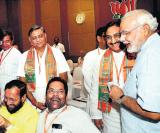 Panaji, Jun 9: Amid strong differences within the top leadership of the Bharatiya Janata Party (BJP) over a role for Gujarat Chief Minister Narendra Modi in the 2014 Lok Sabha elections, an announcement on Sunday giving him a prominent position remains a possibility.
Panaji, Jun 9: Amid strong differences within the top leadership of the Bharatiya Janata Party (BJP) over a role for Gujarat Chief Minister Narendra Modi in the 2014 Lok Sabha elections, an announcement on Sunday giving him a prominent position remains a possibility.
There was no decision regarding the new responsibility for Modi on Saturday. However, it is said he may be made either the convener or chairman of the party campaign committee for the Lok Sabha elections.
The rift in the party, heightened by the absence of party veteran L K Advani possibly against the demand for a prominent responsibility for Modi, remained the talking point on the sidelines of the BJP national executive meeting that began here on Saturday.
“Meetings are going on to iron out differences. There will be some clarity by tomorrow (Sunday) which will be spelt out by party president Rajnath Singh,” a senior leader said.
Singh spoke to various leaders, including allies. He is said to have discussed the issue with Advani and ally Janata Dal-United leader Nitish Kumar.
There was also speculation that Rajnath Singh had put forth a proposal before Advani by which Modi would be made convener of the campaign panel. Advani had agreed to it.
If this is agreeable to Modi, then Rajnath may head the panel in his capacity as party chief. However, party spo¬k¬esperson Nirmala Sitharaman, termed it “media speculation.”
A senior leader pointed out that the party president could make an announcement regarding the campaign committee chief, but any decision on the prime ministerial candidate should be taken in the presence of Advani.
Party spokesman Javadekar told journalists, “Rajnath Singh told the delegates that they would go to their respective states after the meeting with new energy, new confidence and enthusiasm.”
The absence of Advani, who has never missed any party meeting ever since the founding of the BJP in 1980, has been attributed to the pressure to make Modi campaign panel head although the official reason given for it was his illness.
Several leaders considered part of his camp—Jaswant Singh, Yashwant Sinha, Uma Bharti, Shatrughan Sinha, B C Khanduri and Maneka Gandhi—have also stayed away from the meeting. Uma Barti has said she is unwell. Ravishankar Prasad and Varun Gandhi are abroad.
The issue did notfigure at the executive meeting that discussed a resolution on national security. Rajnath Singh may raise the issue in his concluding remarks on Sunday as there is immense pressure on the leadership from the party rank and file and a section of the senior leaders that Modi be given a prominent role ahead of elections. Advani is said to have opposed this move.
The 85-year-old leader, who is said to be still nursing an ambition of leading the party in the 2014 elections, will not be attending the concluding session on Sunday either. Asked why several leaders, known to be close to Advani, have also stayed away, party spokesman Prakash Javadekar remarked, “It is the change of season and it is natural that some may fall sick.”





Comments
Add new comment